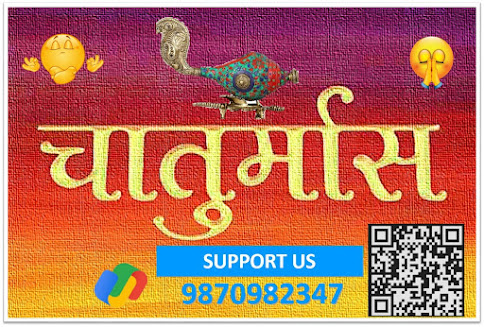Chaturmas
VEGETARIAN FOOD IN
SHRAVAN
&
CHATURMAS
Chaturmas means four months. Chaturmas is a holy
period in Hinduism. Which starts on Ashad Shukla Ekadashi and ends on Kartik
Shukla Ekadashi. The Hindu months of Ashadha, Shravan, Bhadrapada, and Ashwin fall in Chaturmas. During this time,
Hindus worship Lord Vishnu, Lord Shivji and perform religious rituals.
Why is vegetarian food served in the month of Shravan?
Chaturmas are considered to be when nature rests and deities
sleep. During this time Hindus also rest and engage in religious activities.
They worship Lord Vishnu, recite religious texts, and give charity.
There are some important religious rituals during Chaturmas, which include the following.
Ø Ganga bath
Ø Worship of Lord Vishnu
Ø Reading religious texts
Ø Donation
Ø Fasting
Chaturmas is considered a time when Hindus can
purify their soul and attain moksha. This is a time when Hindus can pray for
peace and prosperity.
Ritual, Diet, and Nature Meditation:
All are unique paths to spiritual and physical
health. Diet holds special importance in Indian culture and becomes more
important as each month approaches. Especially during the month of Shravan, a
vegetarian diet is followed during this month. This article explains why we eat
vegetarian food during the month of Shravan and its spiritual, Ayurvedic, and
environmental significance.
Significance of Shravan Month
Shravan month is also known as Savan month
according to the Hindu calendar and falls in July-August. This month is considered
the month of Lord Shiva and special importance is given to his worship.
Worshiping Lord Shiva on Mondays in Shravan gives special fruits and hence this
month is very important for Shiva devotees.
This month falls in the rainy season and offers a
great display of natural beauty. Nature blooms with beautiful greenery, which
fills the atmosphere with color. This month is characterized by pleasant
weather and people enjoy visiting their favourite holy places.
Spiritual Significance:
From a spiritual point of view, vegetarian food is
very important in the month of Shravan. Many religious and spiritual events
take place this month, such as the Kanvariyan festival, Shravan Monday, Shravan
Saturday, Gokul Ashtami, Sankashti, etc. The tradition of following a
vegetarian diet is extremely important in these events.
1. Spiritual Purification:
Following a vegetarian diet
during the month of Shravan cleanses one's body from a spiritual perspective.
It is a kind of penance towards spirituality and takes one closer to the inner
self.
2. Moderation and self-control:
By following a
vegetarian diet, a person exercises restraint over his eating habits and learns
self-control. It helps a person control his senses and helps him progress
toward his soul.
3. Self-development:
Following a vegetarian diet
sustains one's physical and mental health. It gives him an opportunity to
progress toward self-development and helps him to realize his inner self.
Ayurvedic Significance:
From an Ayurvedic point of view, following a
vegetarian diet during this month of Shravan promotes various qualities in the
body and makes a person feel healthy and energetic.
1. Natural Diet:
A vegetarian diet uses natural ingredients like
fruits, vegetables, cereals, etc. These foods fully nourish your body and help
keep it healthy.
2. Physical Health:
Following a vegetarian diet
supplies your body with nutrients and improves your physical health. It turns
your body towards holistic development and fills it with energy.
3. Nutrition:
Vegetarian food contains an adequate amount of
nutrients, which meet the nutritional requirements of your body. It protects
your body from diseases and strengthens your natural immune system.
Importance of Environmental Protection:
If we follow a vegetarian diet in the month of
Shravan, we too can play our role towards environmental protection.
1.
Conservation of plants:
By following a vegetarian diet we
reduce deforestation and pollution. It plays an important role in the
protection of plants and promotes their vegetative growth.
2.
Water conservation:
Vegetarian food consists mostly
of natural ingredients, which require minimum water for production. It also
helps with water conservation.
3.
Animal Protection:
By following a vegetarian diet,
we also contribute towards animal protection. Because we get most of our
nutrients from a vegetarian diet, it also improves the direction of animal
protection in our view.
Summary
Following a vegetarian diet during the month of Shravan is an important step towards spiritual, Ayurvedic, and environmental protection. It offers us the benefits of spiritual purification, physical health, self-development and environmental protection. At the same time, it is a unique way to balance our dietary habits and induce our natural and spiritual renewal. Chaturmas is considered a time when Hindus can purify the soul and attain moksha. This is a time when Hindus can pray for peace and prosperity.
FAQ on
Shravan Month’s Food
Q: What
food can be eaten during Shravan fast?
A: Sabudana
Khichdi, Singhare Atte Puri, Singhare Atta Dosa, Sabudana Kheer, Sweet Potato
in Jaggery Syrup, Potato dry Sabji for Fasting.
Q: What
should we eat in Shravan Somvar?
A: A
sattvic diet of fresh fruits, vegetables, nuts, seeds, unprocessed food, and dairy products can help to
improve health and mental clarity, making it easier to meditate and worship
Lord Shiva.
Q: What
are the rules for the holy month of Shravan?
A: During the holy month of Shravan, let us abstain
from consuming alcohol, meat, eggs, onions, garlic, mustard oil, sesame oil,
masoor dal, and brinjal. These foods are considered to be ‘Tamasic’ and can
cloud our minds and prevent us from connecting with the divine.
Q: What
happens if we eat non-veg in Shravan?
A: The month of Shravan is a time for spiritual introspection
and purification. By avoiding non-vegetarian foods, we can cleanse our minds
and bodies and connect with our inner selves.






















No comments:
Post a Comment
If you have any doubts, please let me know